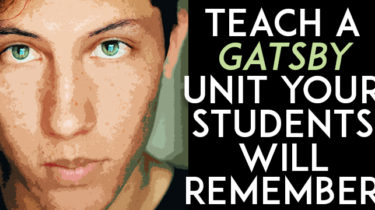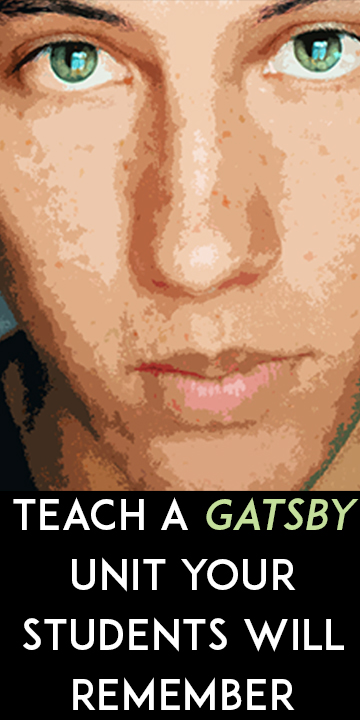How To teach a Gatsby Unit Your Students Will Remember

Just about every American Literature class in the country will read F. Scott Fitzgerald’s classic novel on the American Dream, but that doesn’t mean that your unit on Gatsby should be like all the others. It’s one thing to fulfill a requirement or simply “cover” the book and it’s quite another to teach an impactful unit on The Great Gatsby that will really make a difference in the way your students view their world.
I’ve been teaching this classic book for years, and it is always one of my favorite units of the year. I love how it gets my classes thinking about equality and dreams and love and jealousy and great story telling.
Here are my top 6 tips for teaching making your Gatsby unit memorable.
Get your students excited to start the novel. Nothing makes a novel unit go smoothly quite like students who are eager to read the book. So it’s worth it to take a day or two to get your classes anticipating the book and its themes. My favorite way to get my students excited to read Gatsby is by getting them thinking about the bigger ideas in a fun, laid-back way. We play a game, do some writing, and watch and discuss a compelling TED Talk—and all of a sudden they are already considering the themes of the novel.
Make sure students actually read the book. If your classes simply listen to your interpretations of the novel without reading it themselves, all the planning in the world won’t help them remember your unit. The best ways that I have found to guarantee that my classes interact with the words on the page is to give daily reading quizzes on the homework with questions that I’ve checked against the most popular online summaries. It might take a little extra work at first, but once students get into the story and realize how much they enjoy actually reading the book, they are usually happy to keep reading for themselves.
Enjoy the suspenseful plot together. One of the main reasons why Fitzgerald’s work endures is because The Great Gatsby is a such compelling story. Just enjoying the mystery with your students as they read it for the first time will go a long way towards helping them remember the book. So play up the questions and drama surrounding Gatsby and his past—students will get more out of the experience when they have fun reading.
Help your classes to experience the historical context.Getting students to appreciate the historical context of a book doesn’t mean lecturing them on dates and important figures or making them sit through videos about stocks and bonds. Instead, get your classes to experience the music, art, and film from the period first hand. Even after the facts of the story have faded from their memory, they’ll still recall the time they listened to an old version of “The Sheik of Araby” in class or that two-minute video on cars in the 20s.
Add diverse voices to the discussion. Gatsby is one of my all-time favorite novels, and yet its author was definitely biased on many issues of class, race, and gender. And so it is essential to include more marginalized views and voices in your unit on Gatsby. I have found great success in including the film “Hoop Dreams” in my American Dream unit. Similarly, poems such as “Let America Be America Again” by Langston Hughes, “Siren Song” by Margaret Atwood, or “We Wear the Mask” by Paul Laurence Dunbar help students to come at the essential questions of the novel from multiple viewpoints.
Help your students discover why this classic novel is relevant to their lives today. Once your classes start thinking about some of the essential questions that Fitzgerald asks in his novel, they’ll realize how much they have in common with the characters in the story. Getting your students to discuss and write about why we lie to ourselves and others, what role deception plays in romantic relationships, or why it is important to have dreams, will help create a truly memorable Gatsby unit. When you incorporate TED Talks, compelling radio reporting, and other contemporary resources in your lesson plans, students will see how we are all still struggling to find answers to these essential questions.
I’ve worked hard to develop a complete unit on The Great Gatsby over the years—adjusting and learning from mistakes and trying new ideas and methods along the way—but the hard work is worth it when I am proud to have a unit that students will remember.
